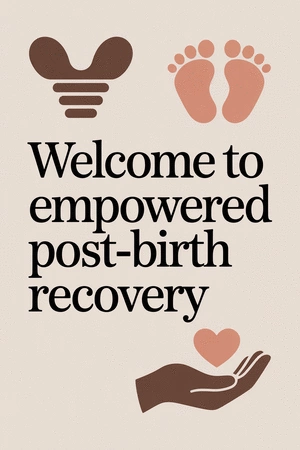What You Will Learn
- Recovery is unique: Each woman’s postpartum experience is different; there’s no one-size-fits-all timeline.
- Emotional changes are normal: It's common to experience a range of feelings, from joy to anxiety, during recovery.
- Prioritize self-care: Taking time to rest and nourish yourself is essential for both you and your baby.
- Seek support: Utilize resources such as healthcare providers, family, and online communities for guidance and encouragement.
- Know your body: Be aware of healing signs and when it’s important to seek medical advice.
- Celebrate small victories: Recognizing and enjoying each step forward in your recovery journey is vital for your emotional health.
- Long-term planning is key: Creating a sustainable recovery plan helps maintain your physical and emotional well-being beyond the immediate postpartum phase.
Recovery Timeline for Vaginal Birth
This visual outlines the key milestones in vaginal birth recovery, emphasizing the importance of self-care and understanding the recovery process.
First Week
Focus on rest and healing; your body needs it!
Weeks 2-6
Begin gentle movements like walking to aid recovery.
After 6 Weeks
Consult with your healthcare provider about resuming more active routines.
Key Emphasizes
Listen to your body; recovery is unique for everyone!
Understanding Vaginal Birth Recovery: An Overview for New Moms
Welcome to the beautiful yet often challenging journey of vaginal birth recovery! As a new mom, you may have a lot on your mind, from caring for your newborn to navigating your own healing process. At Empowered Post-Birth Recovery, we understand how vital it is to be informed about what to expect during this time, and I'm here to guide you through it all.
First things first, let's define what vaginal birth recovery really means. It's the time your body needs to heal after delivering your baby naturally. This recovery phase is not just about the physical aspects; it's also about emotional well-being. Knowing what to look for and how to care for yourself is essential for a smoother journey.
Defining Vaginal Birth Recovery and Its Importance
The significance of understanding your vaginal birth recovery cannot be overstated. It's crucial for your physical and emotional health! By knowing what to expect, you empower yourself to take charge of your healing process. Here are some key points to keep in mind:
- The postpartum phase varies for everyone; there’s no cookie-cutter timeline.
- Recovery encompasses both physical healing and emotional adjustments.
- Taking time for yourself is not selfish; it's essential for you and your baby!
What to Expect Postpartum
Ah, the postpartum period! It’s a time of wonder and adjustment. You may experience physical changes such as cramping, soreness, or even some bleeding, known as lochia. Your body went through a significant event, so understanding your new normal is essential. Resources like the American College of Obstetricians and Gynecologists (ACOG) emphasize the importance of continuous care in the postpartum period to optimize health outcomes for women.
It’s also important to be aware of emotional shifts. You might feel joy, anxiety, or even sadness. Remember, these feelings are all part of the process. Keep an open line of communication with those around you, including family and friends!
Understanding the Recovery Timeline
Every woman’s recovery timeline is unique, but generally, you can expect a few key milestones:
- First Week: Focus on rest and healing; your body needs it!
- Weeks 2-6: Begin gentle movements like walking to aid recovery.
- After 6 Weeks: Consult with your healthcare provider about resuming more active routines.
It's crucial to listen to your body as you navigate this timeline. Just because your friend bounced back quickly doesn’t mean you will—embrace your own pace!
Postpartum Care Essentials
Now, let’s talk about some postpartum care essentials that will help you during this period:
- Staying hydrated is key; aim for plenty of water!
- Keep up with your healthy meals; nutrients will support your recovery.
- Consider using heat or ice packs to soothe discomfort.
- Don’t hesitate to reach out for help; whether that's from family, friends, or experts! The National Library of Medicine's MedlinePlus offers comprehensive patient instructions on postpartum care, including wound care and recognizing warning signs.
By focusing on these essentials, you'll be taking proactive steps towards your well-being, which is the heart of what we strive for at Empowered Post-Birth Recovery.
Physical Recovery Strategies After Vaginal Birth
Transitioning into the physical recovery aspect, it's essential to have a solid strategy in place. Your body has done something miraculous, and it deserves the best care possible! Let's dive into some effective practices that can aid in your healing.
Healing from Vaginal Tears: Safe Practices and Tips
If you experienced vaginal tears during childbirth, it’s vital to recognize symptoms and know when to seek medical help. Symptoms may include:
- Increased pain that doesn’t improve with over-the-counter medication.
- Signs of infection, such as fever or unusual discharge.
- Difficulty passing urine or stool.
Remember, reaching out to your healthcare provider is a sign of strength, not weakness. You deserve to feel your best!
Effective Pain Management Techniques
Managing pain effectively can make all the difference in your recovery journey. Consider these safe techniques:
- Over-the-counter pain relievers like ibuprofen can be helpful.
- Gentle perineal massages may ease discomfort.
- Taking warm sitz baths can promote healing and relaxation.
Experiment with what feels best for you, and don’t hesitate to discuss options with your doctor.
Perineal Healing and Incision Care
Lastly, taking care of your perineum is crucial. Keep the area clean and dry, and consider using protective pads. If you have an incision, follow your doctor’s instructions closely. It’s important to:
- Change dressings as recommended.
- Monitor for signs of infection.
- Practice gentle movements to avoid strain.
By prioritizing these aspects, you’re nurturing your body and setting the stage for a fuller recovery. The NHS provides valuable guidance on what to expect from your body after birth, offering practical advice on wound care and general recovery.
At Empowered Post-Birth Recovery, our goal is to provide you with the resources and support you need. Remember, it’s okay to take your time, and every step towards healing is a step worth celebrating!
Quick Summary
Here's a brief recap of the key points discussed so far:
- Understanding Recovery: Vaginal birth recovery involves both physical healing and emotional adjustments.
- Postpartum Expectations: Each woman's recovery timeline is unique, so it's important to listen to your body.
- Self-Care Essentials: Hydration, nutrition, and seeking help are vital for a smoother recovery process.
Frequently Asked Questions (FAQs) About Vaginal Birth Recovery
Here are some common questions new moms have about vaginal birth recovery:
- Q: How long does vaginal birth recovery typically take?
- A: While every woman's experience is unique, the initial recovery phase typically lasts about 6 weeks. However, full emotional and physical recovery can take several months or even longer. It's crucial to listen to your body and not rush the process.
- Q: What are the most common physical challenges during recovery?
- A: Common physical challenges include perineal soreness, vaginal tearing or episiotomy healing, uterine contractions (afterpains), lochia (postpartum bleeding), and discomfort from hemorrhoids or constipation. Gentle pain management and proper hygiene are key.
- Q: Is it normal to experience emotional changes after vaginal birth?
- A: Yes, it is very normal to experience a wide range of emotions, including joy, anxiety, and even sadness (often referred to as the "baby blues"). Hormonal shifts, sleep deprivation, and the demands of newborn care contribute to these feelings. If these feelings persist or worsen, it's important to seek support from a healthcare provider.
- Q: When can I resume exercise after vaginal birth?
- A: Most healthcare providers recommend waiting until your 6-week postpartum check-up before gradually resuming more strenuous exercise. However, gentle movements like walking can often begin earlier, once you feel comfortable. Always consult your doctor before starting any new exercise routine.
- Q: What are some essential self-care tips for new moms?
- A: Prioritize rest whenever possible, stay well-hydrated, eat nutritious meals, practice good perineal hygiene, and don't hesitate to ask for help from your partner, family, or friends. Connecting with other new moms and seeking professional support when needed are also vital.
Key Takeaways on Vaginal Birth Recovery for Moms
As new moms, understanding the recovery process after a vaginal birth is essential. Remember, it’s not about rushing back to your pre-baby self but rather embracing a new chapter of healing and strength. Here are some important insights to keep in mind as you navigate this journey!
Recovery is a multifaceted process that involves physical, emotional, and social aspects. As you work through your postpartum experience, it can help to focus on key areas of healing. At Empowered Post-Birth Recovery, we believe in the power of education and support, so let’s summarize some critical points to consider.
- Be patient with yourself: Recovery takes time, and it's normal to have ups and downs.
- Seek support: Utilize resources, whether it's a healthcare provider, friends, or online communities.
- Prioritize self-care: Your well-being is crucial—make time for rest, nourishment, and gentle exercises.
Summarizing Important Recovery Insights
Reflecting on the insights gained during your recovery can be empowering. Everyone’s experience is different, and it's vital to honor your own journey. Here’s a quick recap of some key points to keep in mind:
- Know your body: Understand the signs of healing and know when to seek help.
- Embrace small victories: Every step forward is a step in the right direction, whether it’s a walk outside or finishing a meal without interruptions.
- Connect with others: Sharing your experiences with fellow moms can provide valuable support and encouragement.
As you navigate postpartum recovery, always remember that you are not alone. There’s a community here to uplift you, and at Empowered Post-Birth Recovery, we’re dedicated to providing the resources and guidance you need for a smooth recovery.
The Importance of Patience and Self-Care
Patience is the name of the game! Your body has just completed a monumental task, and it deserves the time and care needed to heal properly. It’s easy to get caught up in the urge to “bounce back,” but focusing on self-care practices can help you get there in a healthier way.
Remember, self-care isn’t just about bubble baths and relaxation (though those are nice!); it’s also about:
- Prioritizing sleep when you can.
- Eating nourishing meals to support your healing.
- Engaging in gentle movements like walking or postnatal yoga.
By nurturing your body and mind, you’ll create a strong foundation for lasting recovery. Take the time to check in with yourself and remember that every new mom is on her own journey.
Utilizing Available Resources for Comprehensive Support
Finding the right resources can make a world of difference in your recovery process. There are numerous avenues to explore, from local support groups to online communities. Here’s what you can do:
- Join a local mom group to share experiences and advice.
- Reach out to healthcare professionals for tailored guidance.
- Utilize online platforms to connect with other mothers and share tips.
At Empowered Post-Birth Recovery, we’re passionate about helping you access the resources you need. Remember, asking for help is a sign of strength, not weakness! You deserve a supportive network as you embrace this transformative period.
Encouragement for New Moms: Embracing the Fourth Trimester
The fourth trimester can be a whirlwind of emotions and changes, but it’s also a time to celebrate your strength and resilience! As you maneuver through recovery, remember to find joy in the little moments. You are doing an incredible job, and every small step counts!
Finding Strength in the Recovery Journey
As new moms, we often forget to celebrate our achievements. Recovery isn’t only about physical healing; it’s also about emotional and mental growth. Here’s how you can find strength in your journey:
- Reflect on your progress regularly—write it down if that helps!
- Practice gratitude for the small things, like a quiet moment with your baby.
- Engage in activities that make you feel good, whether it’s reading, crafting, or enjoying time with friends.
Celebrating Small Victories During Recovery
Every little victory counts, so it’s essential to recognize and celebrate them! Whether you managed to take a shower, cook a meal, or simply get out of the house, each step forward is worth acknowledging.
Here are some ways you can celebrate:
- Share your achievements with a friend or partner.
- Reward yourself with a treat or a small self-care activity.
- Take a moment to reflect on how far you've come since childbirth.
Celebrating these moments can boost your mood and reaffirm that you are on the right path!
Creating a Long-Term Recovery Plan for Continued Well-Being
Looking beyond the immediate postpartum phase is crucial for sustained well-being. A long-term recovery plan can help you continue to grow in your role as a mother. Consider these steps:
- Set realistic goals for your physical and emotional health.
- Incorporate ongoing support from professionals, family, and friends.
- Make time for hobbies and activities you love to nurture your spirit.
At Empowered Post-Birth Recovery, we believe your journey doesn’t end with childbirth—it’s just the beginning! Embrace the changes, continue to seek support, and know that every step you take is a testament to your strength as a new mom.
Recap of Key Points
Here is a quick recap of the important points discussed in the article:
- Understand Your Recovery: Recovery from vaginal birth varies for each woman, encompassing both physical and emotional healing.
- Listen to Your Body: Pay attention to your body’s signals and embrace your recovery timeline without comparison to others.
- Prioritize Self-Care: Hydration, nutrition, rest, and gentle exercise are essential for a smoother recovery.
- Seek Support: Connect with healthcare providers, friends, and community resources to help navigate this journey.
- Celebrate Small Victories: Recognize and celebrate every step forward in your recovery, no matter how small.







